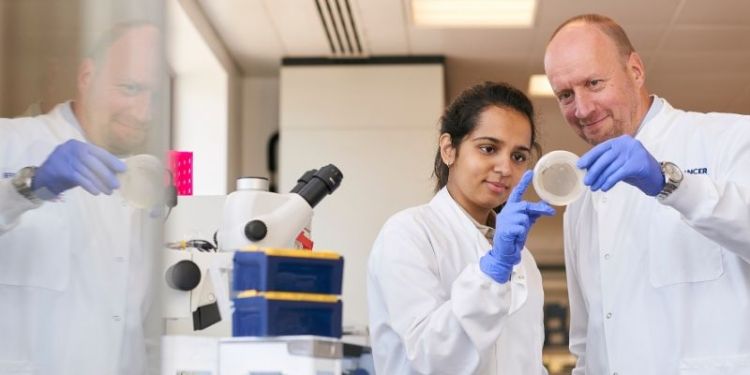Advanced Training Programme in Biological Sciences
Cell Biology Techniques

Monday 13 – Friday 17 July 2020
Overview
In this course you will learn about techniques that support research at the cellular level, using a receptor signalling pathway as a key example. You will apply different techniques to study the effects of Epidermal Growth Factor (EGF) on cancer cells, including methods for evaluating the cellular levels of the EGF receptor, activation of EGF receptor-linked signaling pathways, and downstream effects on cancer cell growth.
Practical content
- Cell culture, focusing on aseptic technique, cell counting and monitoring the health of your cultures.
- Live cell imaging using the EVOS automated microscopy system, using fluorescent proteins to report on the cell cycle.
- Using the ImageJ suite of programmes to analyse microscopy images.
- Protein expression analysis by SDS-PAGE and quantitative immunoblotting.
- Analysis of cell surface proteins by flow cytometry.
- Transfection of cultured mammalian cells for protein expression and RNAi applications.
- Biochemical methods for detecting activation of cell signaling pathways; detection of protein kinase activity.
- Statistical methods for analysing the data collected during the week.
Learning outcomes
On completing this course you should:
- Understand how to maintain cell cultures and link this to your experimental planning.
- Be able to design effective experiments for monitoring the effects of different conditions on cell growth.
- Be competent in the use of ‘industry standard’ software for analysing microscopy images.
- Be able to design and execute experiments to evaluate the relative levels of expression a specific protein in a cell, and to be able to control experimentally the levels of that protein.
- Be able to design and execute experiments to evaluate the location of specific protein within the cell.
Course structure
You will work in small teams to conduct your own experiments and collect data, under the guidance of a team of experienced teachers. At the end of the course, we will bring together the class data for analysis. There is no formal assessment.
Who would benefit from this course?
- Graduates from scientific disciplines outside the molecular/cellular biosciences looking to develop competencies in these areas.
- Recent graduates preparing to undertake Masters-level training with a significant research component.
- Recent graduates with limited practical biosciences experience wishing to increase their competitiveness for research degree (PhD) programmes.
- Undergraduate students approaching their final year of study, in particular those preparing for research projects.
Fees and funding
Programme fee: £750 per week payable to the University of Leeds prior to the course starting. This fee includes tuition costs, consumables for the practical sessions and lunch during the teaching day. It does not include costs for accommodation or any living expenses.
If you’re unsure about the application process, contact fbsadmissions@leeds.ac.uk or +44 (0) 113 343 3021.
How to apply
Applications for 2020 are now open!
All applications for the Advanced Training Programmes must be made online. The application deadline for the Advanced Training Programmes is 4pm on May 6 2020.
We recommend that you apply as soon as possible as enrolment is limited and allocated on a first-come first-served basis. Applying early also means you are more likely to secure a place on your first choice of course as popular subjects are likely to fill up quickly.
Read about visas, immigration and other information in International students.

